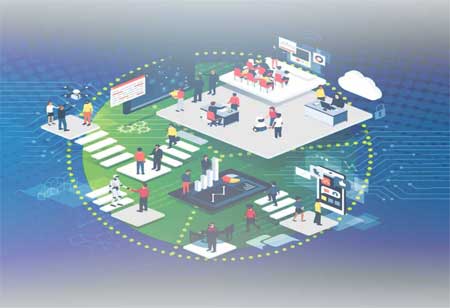THANK YOU FOR SUBSCRIBING
Leading Smart City Development
The pursuit of smart city development is not just a trend; it's a necessity in our rapidly evolving world.

By
Apac CIOOutlook | Wednesday, October 25, 2023
Stay ahead of the industry with exclusive feature stories on the top companies, expert insights and the latest news delivered straight to your inbox. Subscribe today.
Discusses several components and technologies required for building a city to ensure a good quality of life for its habitats.
FREMONT, CA: The pursuit of smart city development is not just a trend; it's a necessity in our rapidly evolving world. A smart city uses cutting-edge technologies to improve public services, business opportunities, city infrastructure, cost and resource efficiency, and civic engagement.
Smart city infrastructure encompasses various components that, individually or in combination, significantly enhance operational efficiency and residents' quality of life. There's no one-size-fits-all model for a smart city. Still, key elements include citizen engagement, efficient government services, broadband connectivity, public safety technology, energy efficiency measures, promotion of healthier communities, and intelligent transportation systems.
Besides, data analytics is pivotal in helping cities make informed, timely decisions to improve operations, conserve resources, enhance security, and manage budgets effectively. These aspects, when integrated, create a dynamic and sustainable urban environment that fosters progress and a high quality of life for its inhabitants.
Exemplary Smart City Technologies
City planners should prioritise infrastructure improvements that reduce energy consumption and result in cost savings in maintenance and operations, benefiting both the environment and the community, when planning sustainable urban developments with smart city solutions. These intelligent infrastructure upgrades can strengthen a city or town's resilience without requiring a significant upfront investment. Smart energy grids, which incorporate renewable sources like solar panels and wind turbines to reduce carbon emissions and improve energy resilience, are essential policies.
Additionally, installing smart metres and demand response systems enables homeowners and businesses to control energy usage more effectively, particularly during peak hours. Microgrids ensure resilience for communities on the edge of the larger grid by providing lower utility costs, improved system reliability, and a steady power supply. Business intelligence gives cities a significant advantage by combining information and insights into a single, integrated platform. This enables proactive management of energy resources and real-time visibility, enabling better decision-making. Different approaches to smart water management are advantageous for cities and towns.
Advanced metering infrastructures (AMI) and smart water metres improve the accuracy of water data, maximise water revenue, and provide features like remote control and leak detection, among others. Moreover, networked LED streetlights serve as a fundamental element and are crucial to the management of smart cities. These streetlights interact intelligently with their surroundings, monitoring air quality, noise levels, traffic flow, and pedestrian movement with sensors, wireless connectivity, and advanced technology.
The ability to make wise decisions that improve overall efficiency and the livability of the city is given to city officials by this useful data. Environmental sensors play a critical role in smart city initiatives by continuously monitoring pollution levels, noise levels, air quality, and weather conditions. These sensors provide city officials with the data they need to manage environmental resources better and give citizens up-to-date information. Besides, offering Wi-Fi access that is free or reasonably priced in public places promotes digital inclusion and connectivity. It makes it easier for various smart technologies, like digital exhibits, to function. Installing surveillance cameras with AI-powered analytics is essential for ensuring public safety because it allows for the early detection of potential dangers or emergencies.
Rapid dissemination of this crucial information to law enforcement and emergency services will speed up response times and enhance public safety. IoT sensors and data analysis are used in smart waste management systems to optimise waste collection and recycling by modifying collection routes and schedules. Waste sorting technologies also automate procedures, increasing recycling rates and sustainability in general. Numerous solutions in the field of smart transport systems improve city transit. These include adaptive signal control and real-time traffic monitoring to lessen traffic congestion.
By embracing these insights, city leaders can navigate the challenges and opportunities of the digital age, ultimately paving the way for smarter, more connected, and thriving urban communities.





